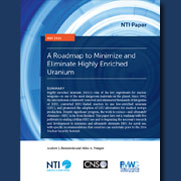
Comprehensive Update of HEU Resources Now Available
The Civilian HEU Reduction and Elimination Resource Collection has been updated by CNS in the wake of the April 2016 Nuclear Security Summit (NSS).
Global Nuclear Terrorism Risk Still High, Despite Progress; New Administration Must Take Immediate Steps to Reduce Dangers
The world still faces a “very real” risk that terrorists could get a nuclear bomb, and the Obama Administration must make reducing that risk a top priority of U.S. security policy and diplomacy, according to Securing the Bomb 2008, a report released today. The new report was accompanied by a paper offering a specific agenda for the presidential transition and the opening weeks of the new administration.
“President-elect Obama has an historic opportunity to drastically reduce the risk of nuclear terrorism in his first term in office,” said Prof. Matthew Bunn of Harvard University’s Project on Managing the Atom, the report’s author. “But it will take sustained White House leadership to close the gaps in existing efforts and get past the obstacles slowing progress. He needs to appoint a senior White House official to take on this responsibility full-time, keeping it on the front burner at the White House every day.”
The report details a broad range of progress in efforts to reduce the danger, including programs that have eliminated potential nuclear bomb material entirely from dozens of buildings and have substantially beefed up security for scores of sites. But it warns that major gaps in these efforts remain, and the risk of nuclear terrorism is still unacceptably high. The study provides a frightening survey of incidents around the world, from an armed break-in at a South African site with hundreds of kilograms of highly enriched uranium (HEU), to a Russian colonel arrested for soliciting bribes to overlook violations of nuclear security rules, to increasing terrorist threats amid Pakistan’s ongoing strife, to weak security at many of the roughly 130 research reactors worldwide still using HEU fuel.
“To meet this threat, we must build a real nuclear security partnership with Russia and work with all nations to secure stockpiles around the world,” said former Senator Sam Nunn, Co-Chairman of the Nuclear Threat Initiative, which commissioned the report. “This report offers the road-map we need to win the race between cooperation and catastrophe.”
The new study reports that U.S.-sponsored security upgrades have been completed for approximately 75 percent of the buildings in the former Soviet Union that contain weapons-usable nuclear material, and for roughly 65 percent of Russia’s nuclear warhead sites. Major issues remain, however, ranging from insider theft and corruption to chronic underinvestment in nuclear security. In much of the rest of the world, the effort is in much earlier stages. The Department of Energy’s Global Threat Reduction Initiative has accelerated efforts to convert research reactors to low-enriched uranium that cannot be used in a nuclear bomb and has accelerated removals of HEU from vulnerable sites. But only about a quarter of these sites have had all of their HEU removed, and only about a quarter of the HEU-fueled research reactors have had security measures put in place that could defeat demonstrated terrorist and criminal threats. Current plans to take back U.S.- supplied HEU would not address more than three-quarters of the U.S.-supplied HEU abroad (most of it in wealthy countries).
Recommendations
The report, and the accompanying transition paper “Preventing Nuclear Terrorism: An Agenda for the Next President,” co-written by Prof. Bunn and Managing the Atom research associate Dr. Andrew Newman, outline specific steps that President-Elect Obama should take that, together, could drastically reduce the risk of nuclear terrorism:
Securing the Bomb 2008 and its online companion is the only available source for “one-stop shopping” on all aspects of these critical U.S. security programs. Since NTI first commissioned this annual report from the Managing the Atom Project in 2002, the report and its recommendations have increased public awareness of the nuclear terrorism threat and helped spur increased government action to reduce nuclear dangers.
The Project on Managing the Atom, based at the Belfer Center for Science and International Affairs at Harvard’s John F. Kennedy School of Government, is Harvard’s principal research group focusing on nuclear weapons and nuclear energy policies. NTI is a Washington-based non-profit organization, focused on reducing the threats from nuclear, biological, and chemical weapons and materials.
###
Sign up for our newsletter to get the latest on nuclear and biological threats.
The Civilian HEU Reduction and Elimination Resource Collection has been updated by CNS in the wake of the April 2016 Nuclear Security Summit (NSS).
A new paper published by NTI, the Center for Nonproliferation Studies and the Fissile Materials Working Group offers timely recommendations for action that countries can pursue ahead of the 2016 Nuclear Security Summit.
NTI Co-Chairman Sam Nunn welcomes the news that Ukraine will eliminate its highly enriched uranium.
